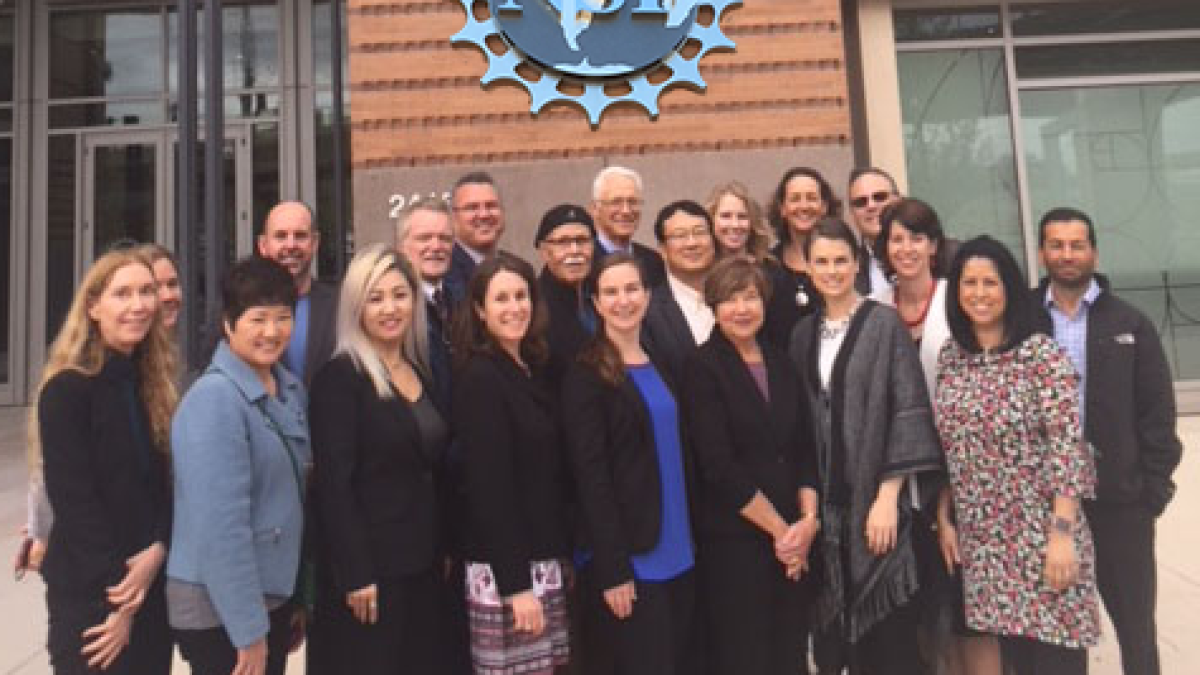Kickstarting STEM success

Faculty and staff from Cohort 3 of the KickStarter Program at the National Science Foundation headquarters. Photo courtesy of Science Foundation Arizona Center for STEM at ASU.
Building inclusive communities and driving innovation in STEMscience, technology, engineering, math are two of Arizona State University’s core values. The Science Foundation Arizona Center for STEM is strengthening this legacy through its KickStarter Program.
Through the National Science Foundation-funded program, SFAz Center for STEM at ASU, headed by Director Caroline VanIngen-Dunn, identifies two-year Hispanic-serving institutions eligible for federal funding and helps faculty develop competitive STEM education research proposals. In the past three months, the program has helped seven Hispanic-serving institutions receive over $5.5 million dollars in awards aimed toward strengthening STEM initiatives within their communities.
Data gathered by the U.S. Department of Education’s Office for Civil Rights shows that, from as early as eighth grade, Hispanic students are less likely to participate in STEM programs because of a lack of resources and equipment in schools, less access to early education and low expectations for STEM performance. The KickStarter program aims toward aiding Hispanic-serving institutions, which have 25% or more Hispanic student enrollment, secure grants to overcome these obstacles.
“KickStarter has provided us with a replicable path to organize and strategize on NSF and other federal grants,” said Phil Lister, chair of biology and biotechnology at Central New Mexico Community College. “With such a large institution, it has been very easy to have projects and goals living in silos, but developing a cross-departmental team has alleviated some of the former fragmentation on goals and grant proposals.”
Since its inauguration, the KickStarter Program has helped community colleges receive awards totaling over $10 million. These funds reach 1,017 students, 341 faculty, 35 industry partners, 21 K–12 partners and 26 postsecondary partners at granted community colleges.
The funding supports STEM scholarships, new courses, curriculum development, new classroom equipment, faculty professional development, culturally relevant practices and undergraduate research experiences.
Faculty can seek funding to put toward creating webinars and workshops about STEM team formation, assessment, planning and proposal development to perform more meaningful research and better engage with their students.
"It's very gratifying to see our work reaching people across the country and giving young people who otherwise might not have the opportunity to engage in STEM learning and research access to these experiences," said Cynthia Pickering, research program manager at the Center for STEM at ASU.
Some NSF grants that have been funded include the Integrating Research, Mentoring, and Industry Collaborations to Improve STEM Recruitment and Retention at Phoenix College; Cybersecurity Opportunities and Methods that Promote Access and Student Success at Miami Dade College in Miami, Florida; and the Increasing the Student Biotech Pipeline at Los Angeles Mission College. The STEM-Mia project which provides support to low-income STEM students at Miami Dade College also received support.
Seven institutions recently awarded grants in 2019 through SFAz Center for STEM at ASU include University of New Mexico Taos, Central New Mexico Community College, Southwestern Community College, Pima Community College, West Hills Coalinga Community College, Central Arizona College and Mountain View College.
One of the recent awards will sponsor a three-day national conference at ASU in the summer of 2020. The NSF-sponsored conference aims to identify the unique challenges that rural Hispanic serving institutions face in developing effective STEM programs with robust student enrollment. By bringing together leading faculty, staff, students and community partners, the conference will lay a foundation for potential solutions that can increase the quality of life and economic success for the people of these communities.
Pickering believes that the Center for STEM at ASU’s work with community colleges can have global impact because STEM students are better prepared to thrive in a four-year institution and in the workforce.
“The work that SFAz Center for STEM at ASU does with community colleges results in funding for STEM programs that advance inclusivity, access and student-centered practices at those institutions,” Pickering said. “These outcomes directly align with ASU’s mission to include and support students of every economic, social and cultural background in the classroom and in their communities.”
In the future, SFAz Center for STEM at ASU aims to implement existing awards effectively, work with more Hispanic-serving institutions, measure direct impacts of NSF grants and publish the results of their work.
Written by Maya Shrikant
More Science and technology

4 ASU researchers named senior members of the National Academy of Inventors
The National Academy of Inventors recently named four Arizona State University researchers as senior members to the prestigious…

Transforming Arizona’s highways for a smoother drive
Imagine you’re driving down a smooth stretch of road. Your tires have firm traction. There are no potholes you need to swerve to…

The Sun Devil who revolutionized kitty litter
If you have a cat, there’s a good chance you’re benefiting from the work of an Arizona State University alumna. In honor of…

